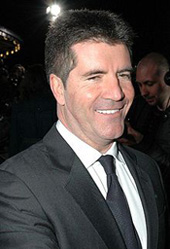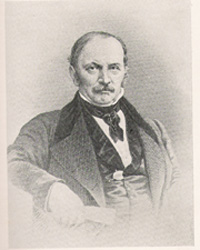Will Simon Cowell Regret His “Insurance Policy”?
Posted on 05 September 2011, 13:51
According to a recent Web report, Simon Cowell, (below) the popular American Idol and X-Factor judge, wants his body frozen by cryogenics upon his death. He was quoted as saying that he sees it “basically as an insurance policy” that might pay off in about 300 years when science figures out how to restore life to a human body.

I think it goes without saying that anyone who opts for cryogenics is a pure materialist and philistine, fearing death and not believing that he will “live on” in a greater reality.
As Cowell appears to see it, he has nothing to lose beyond the cost of the cryogenics, and since he is obviously a very rich man that is of little or no concern. In other words, if science doesn’t figure out how to restore bodies to life, he will, in his view, be no worse off than if he had chosen burial or cremation.
Since Cowell apparently has made up his mind that life is nothing but a march into an abyss of nothingness, it is unlikely that he is open to various messages purportedly coming to us from the spirit world which say that magnetic currents can hold the spirit body close to the physical body after death and that separation can be expedited somewhat by speedy disposal of the physical body, as with cremation. If these messages are credible, and I believe they are, Cowell’s “insurance policy” could turn out to be the worst investment of his life, as his frozen remains may keep him in an “earthbound” condition for a long time, however time is measured in that realm.
According to a number of esoteric teachings arising out of spirit communication, the magnetic currents hold the spirit body close to the physical body during earthly life and continue to some degree after death depending on the degree of spiritual consciousness achieved by the individual while alive in the flesh. That is, the more spiritual consciousness the person develops, the quicker the magnetic currents are destroyed. Conversely, the soul who has not developed much spiritual consciousness will be slow in breaking the magnetic bonds, thus lingering around his or her physical remains in the earthbound condition, indefinitely, not completely comprehending the fact that he/she is “dead.”
“The moral state of the soul is the condition which determines the ease, or the difficulty, with which the spirit disengages himself from his terrestrial envelope,” explained Allan Kardec, (below) a 19th Century French psychical researcher who communicated with many advanced spirits. “The strength of the affinity between the body and perispirit (spirit body) is in the exact ratio of the spirit’s attachment to materiality; it is, consequently, at the maximum in the case of those whose thoughts and interests are concentrated on the earthly life and the enjoyment of material pleasures; it is almost null in the case of those whose soul has identified itself before with the spirit life.”

Kardec likened the “earthbound” condition to somnambulism, as in sleepwalking, when the somnambulist who is thrown into a magnetic sleep cannot believe that he is not awake. “Sleep, according to their idea of it, is synonymous with suspension of the perceptive faculties, and as they think freely, and see, they appear to themselves not to be asleep,” he further explained.
If I am interpreting various metaphysical teachings correctly, the “magnetic currents” should not be confused with the so-called silver cord, the connecting link between the physical body and the spirit body. The silver cord will have been severed at the time of physical death, liberating the spirit body, but the magnetic currents can still keep the spirit body close to the physical body. Moreover, cremation does not undo the gravitational pull of a materialistic life, but it at least mitigates the pull.
Silver Birch, the eloquent and apparently “high” spirit who spoke through the entranced British medium Maurice Barbanell for some 50 years, was asked if cremation is the preferred method of disposal. “Yes, always, because essentially it has the effect of putting an end to the idea that the spirit is the physical body,” he replied.
“By the use of fire, all forms are dissolved; the quicker the human physical vehicle is destroyed, the quicker is its hold upon the withdrawing soul broken,” medium and mystic Alice A. Bailey recorded, adding that the etheric body is apt to linger for a long time on the ‘field of emanation’ when the physical body is interred, and it will frequently persist until the physical body has completely decayed. Since cryogenics prevents decay, one can only agonize at how long the spirit might be stuck in the earthbound condition, perhaps puzzled at why other frozen bodies are not speaking with him.
Of course, the skeptic and secular humanist will scoff at all this and argue that a non-believer in the survival of consciousness at death can live a very moral life without believing in anything spiritual. Certainly, there are many examples of this and there are countless examples of people with surface spiritual beliefs leading lives of low morality or depravity. As William James said, “If religion be a function by which either God’s cause or man’s cause is to be really advanced, then he who lives the life of it, however narrowly, is a better servant than he who merely knows about it, however much. Knowledge about life is one thing: effective occupation of a place in life with its dynamic currents passing through your being is another.”
So what then of the very moral person who is a non-believer in God or an afterlife (keeping in mind that one does not have to believe in God to believe that consciousness will survive death)? Should he be punished by remaining “earthbound” simply because he failed or refused to believe? Might he not be even a better person than he who led a moral life out of fear of punishment in an afterlife? The answer to this seems to be that it is not about “punishment” by a God or tribunal of any kind. It is about what we, through our free will, have allowed ourselves to believe. “A spirit attaches himself all the more strongly to the life of the body, in proportion to his inability to see anything beyond it,” Kardec offered. “He feels that the organic life is escaping him, and he does his utmost, but in vain, to retain it within his grasp. Instead of yielding himself up to the movement which is drawing him away, he resists it with all his might; and, in some instances, the struggle is thus prolonged for days, for weeks, or for months.”
As I discern the messages, the non-believer who rejects the idea of an afterlife out of intellectual pride or arrogance is much more likely to be earthbound than the person who is shut off from all enlightenment and does not have the opportunity to open his mind to it. The non-believer’s earthbound condition is not the result of an angry and jealous God (“How dare you not believe in Me! You are hereby assigned to the mezzanine level where you will suffer for not believing in Me.”), but a matter of how much “light” the person lets in during his lifetime. If he arrogantly permits his intellect and ego to block the light, then darkness is the result. We are who we make ourselves. We are beings of light to the extent that we absorb the light. We create our own reality.
“They suppose that their state will be forever the same,” a spirit named Clara told Kardec, referring to those who failed to believe when alive. “They still murmur the words which misled them during life; they are amazed and terrified at their utter solitude; darkness, in truth, it is, this region at once empty and peopled, this space in which, carried forward by a power they do not understand, they wander, pallid, and groaning, without consolation, without affections, without help of any kind…”
Hopefully, Simon Cowell will liberate his ego, open his mind, and let in some light before he transitions, thereby abandoning his plan to “live on” through cryogenics and “live on” in true reality.
Michael Tymn is the author of The Afterlife Revealed: What Happens After We Die, Resurrecting Leonora Piper: How Science Discovered the Afterlife and Dead Men Talking: Afterlife Communication from World War I.
|
Comments
Coyd,
Thank you for the comment, but I don’t completely understand your question. What testimonials? Believe in an afterlife FOR THEMSELVES? I’m sorry, but I don’t get that, either.
My guess is that you are referring to the comments about a very moral non-believer still struggling a bit after death. I have problems with that, myself, as it doesn’t seem just or fair that a person who leads a very good and righteous life, at the same time not believing in survival, should be any worse off than the person who leads a very good and righteous life but who does believe. As I pointed out, the person who doesn’t believe might deserve even more credit as he did it without the fear of punishment in an afterlife.
At the same time, ego and pride seem to play into the non-belief of many good people, i.e., “I am above such superstitious beliefs,” etc. and this may be the difference. The cumulative messages suggest anyone who liberates his ego will “see the light” and therefore will absorb the light and will believe. At least that is the way I interpret them.
I don’t think the good non-believer will really suffer, per se. He will just be very disoriented in the initial stages because he did not absorb enough light when he had the opportunity to.
Sorry I can’t explain it any better than that. It is confusing.
Michael Tymn, Thu 8 Sep, 00:49

Michael:
Your contrast of those shut off from enlightenment with those who fail to believe gives no credit to the possibility that open-mindedness can lead to any other but your conclusions about the afterlife. Do you think that all who have seen the testimonials believe in afterlife FOR THEMSELVES?
Coyd
coyd walker, Tue 6 Sep, 23:31

Add your comment
|